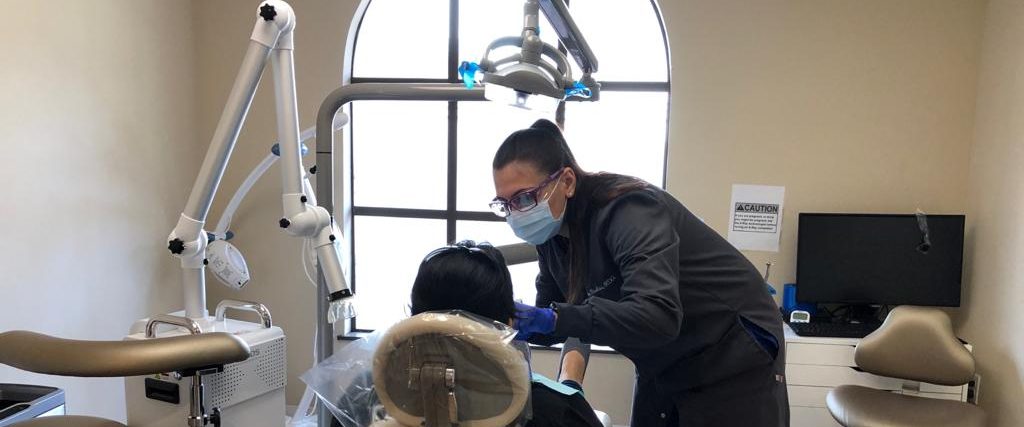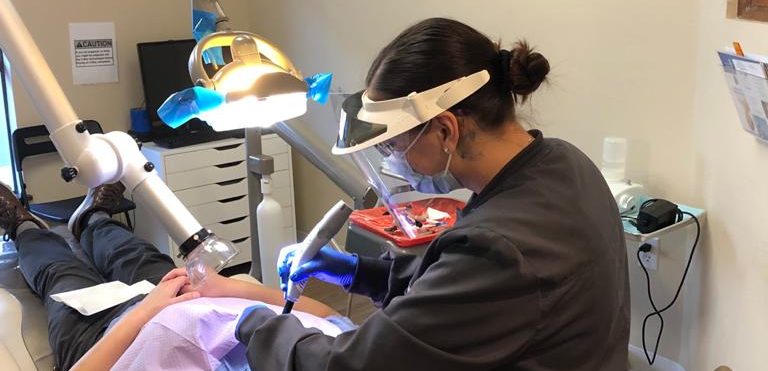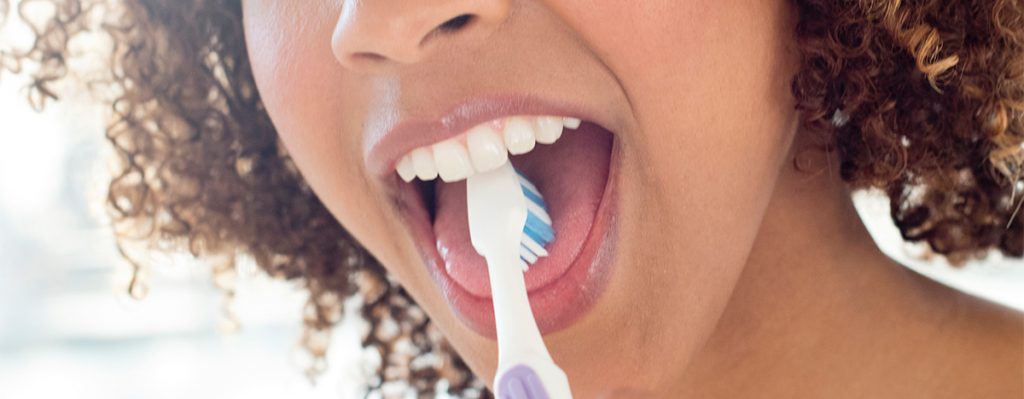Date : 10/08/2020
Bad breath. We’ve all experienced it. Halitosis, the scientific name for bad breath, happens to the best of us.
But here’s the thing:
Halitosis isn’t caused by just stinky foods like onions and garlic. There are tons of causes of halitosis, and most are treatable.
But, do we have to be victims of bad breath? As it turns out, no, we don’t.
First, let’s go over what causes bad breath, some interesting facts about bad breath, and exactly what we can do about it.
What Causes Halitosis?
There are a number of things that cause bad breath. And it’s not just the obvious ones, like eating strong foods like garlic, onions, and coffee.
Poor dental hygiene
The most obvious cause of bad breath is simply not practicing good oral hygiene. Bacteria breaks food particles down in the teeth and mouth. Then, the combination of bacteria and decaying food produce unpleasant odors.
Brushing and flossing regularly remove the plaque, which is a sticky substance that will build up on your teeth to cause odor.
Also, plaque causes peridontal disease and cavities.
Not cleaning dentures
If you wear dentures and don’t clean them every night, they’ll cause bad breath. Follow your dentist’s instructions on how to effectively clean your dentures so that you can avoid bad breath.
Don’t forget to clean your mouth twice a day even if you wear dentures. Just because you no longer have your own teeth doesn’t mean you can neglect your oral care.
Strong beverages and food
Food is the primary source of bad breath. Here are some of the foods that cause bad breath.
- Onions
- Garlic
- Coffee
- Alcohol
- Some cheeses
- Fish
- Spicy foods
- Exotic spices like curry
- Acidic beverages
When you eat garlic, onions, or other foods and beverages that have strong odors, your stomach absorbs the oils from these foods during digestion. Those oils then pass to your bloodstream and travel up to your lungs. Then, your lungs produce odors that other people can notice.
Most mouth odor is short-lived, but some foods get stuck in your teeth, and often we don’t even realize it.
Low carbohydrate dies can cause something caused ketone breath. That occurs because these diets force our bodies to burn more fat as an energy source. That creates the end product of ketones. The ketones cause a fruity odor that smells something like acetone.
Here’s the icky part:
You may be stuck with bad breath for up to 72 hours after eating foods like fried onions. Toss in a couple of beers and….well. Just stay away from folks, let’s say.
Smoking
If you smoke, you already know this: People don’t want to be close to your smoker’s breath.
Smoking causes odors because it dries out your mouth, which makes your bad breath even worse.
First of all, you’re introducing your mouth to all of the nasty chemicals that are in cigarettes and tobacco. These chemicals dry out your mouth and encourage the growth of harmful bacteria.
So it’s not just “smoker’s breath” from the smell of cigarettes. Your smoking is creating a bad environment in your mouth.
Dry mouth
Speaking of dry mouth, it can occur if your mouth doesn’t create sufficient saliva. The scientific name for dry mouth is xerostomia.
Saliva keeps your mouth clean, believe it or not. Furthermore, this helps to reduce odor.
You can get dry mouth if you have a salivary gland condition, take certain medications, or sleep with your mouth open.
Periodontal disease
Some people have diseases that contribute to halitosis. Periodontal disease occurs because people don’t remove plaque from their teeth promptly.
Then, over time, the plaque hardens into tartar. However, you can’t get rid of tartar by brushing, and it irritates your gums.
Not only that, tartar causes small openings called pockets to form between your teeth and gums. Bacteria, food, and plaque collect inside these pockets. This causes a strong odor that worsens bad breath.
Mouth, sinus, and throat conditions
You can get bad breath if you have any of the following.
- Postnasal drainage
- Sinus infection
- Chronic bronchitis
- Infections of the lower or upper respiratory system
Also, tonsil stones can cause bad breath. Bacteria collect on the stones, trapping odors.
Diseases
If you have really bad halitosis, you may have a disease of some sort. Therefore, here are some of the diseases and conditions that can cause extreme halitosis.
- Kidney disease
- Diabetes
- Gastroesophageal reflect disorder (GERD)
- Liver failure
- Tonsillitis
- Acid reflux
- Pneumonia
- Pharyngitis
- Common cold
- Influenza
- Thrush
- Lactose intolerance
- Digestive problems
GERD is one of the most common causes of bad breath. Also, if you have diabetes, liver failure, or kidney failure, your breath can actually smell fishy.
If you don’t keep your diabetes under control, this will affect your breath, too. Interestingly, uncontrolled blood sugar can cause a sweet-smelling mouth odor.
Be sure to keep control of your blood sugar levels.
What Exactly Is Halitosis?
Halitosis is the condition of having bad breath. However, it’s not that simple. Some people suffer from extreme cases of halitosis.
This condition can lead to a significant amount of psychological distress, especially if the sufferer feels that nothing they do helps to control it. However, there are ways to overcome it and treat it.
Fast Facts About Halitosis
Yes, really, there are interesting facts about bad breath. And it’s not as boring as you think.
Listerine introduced the actual word “halitosis” into mainstream American culture
It’s true. In the 1920s, Listerine began using the word halitosis in their advertising.
Although halitosis is actually an old Latin term, Listerine brought it mainstream.
Who knew, right?
That should come as no shock: Listerine’s sales went through the roof after they got us all thinking about bad breath.
Halitosis affects one in four people daily
Yes, that’s right: You’re not alone if you suffer from bad breath. As a matter of fact, studies show that one in four people suffer from bad breath.
Not drinking enough fluids can cause bad breath
People are often surprised to learn that a dry mouth is a common cause of bad breath. Therefore, staying hydrated and avoiding foods that cause mouth dryness can help you control your bad breath.
A really bad bacteria you need to know about
Volatile Sulfric Compounds (VSCs) cause bad breath. These waste products are the primary source of the compounds that cause halitosis.
How Halitosis Is Diagnosed
Obviously, you’ll know if you have bad breath. If you don’t, someone will probably tell you.
However, an official diagnosis of halitosis needs to come from your dentist. To diagnose you, the dentist will smell your breath and ask you questions about the problems you’ve had with it.
Usually, the dentist will schedule an appointment with you in the morning before you’ve eaten anything or brushed your teeth.
First, your dentist will want to know how often you floss and brush, any allergies you have, and what types of food you commonly eat.
Then, they will be interested in whether or not you snore, and how bad it is. Also, you’ll need to provide your dentist with a list of your medications.
Surprisingly, bad breath doesn’t always come from your tongue or mouth. If your bad breath doesn’t appear to be coming from your mouth or teeth, the dentist will probably advise you to schedule an appointment with your doctor so that they can rule out any underlying condition or disease.
How to Treat and Prevent Halitosis 8 Ways
Depending on the cause of your halitosis, there are numerous ways you can treat it yourself.
1. Oral hygiene
First and foremost, the most obvious way to treat halitosis is to practice good oral hygiene. Specifically, this includes brushing twice a day and flossing once per day, especially after meals.
Flossing is important because it releases the food that sticks between teeth. Even if you don’t think it’s there, trust me, it is. Be sure to get in between all of your teeth when you floss.
The great thing is that flossing has become even more convenient with the little flossing disposables that are now available. So, there’s no excuse not to floss regularly.
2. Avoid halitosis that comes from dry mouth
Bad breath is sometimes the result of a dry mouth. Drink plenty of fluids, especially water, throughout the day.
Also, avoid certain foods and beverages that dry your mouth. For example, coffee and alcohol both cause dry mouth.
Talk to your dentist and doctor about your medications. Consequently, some medications cause dry mouth, which will contribute to your bad breath.
Some of the medications that cause dry mouth:
- Antidepressants
- Antihistamines
- Anticholinergics
- Antihypertensives
- Anorexiants
- Anti-Parkinson agents
- Antipsychotics
- Sedatives
- Diuretics
3. Have regular dental checkups
Whether or not you suffer from bad breath, you need to see your dentist regularly. They’ll detect things like gum disease much more quickly than you will.
4. Keep dentures or retainers clean
If you wear dentures or any sort of device in your mouth, be sure to clean it daily by following the instructions of your dental care provider.
Also, be sure to clean carefully in any crevices on your mouth devices, retainers, or dentures. Food can get trapped in them, causing the release of harmful bacteria.
5. Mints and gum
Of course, you can get some relief from bad breath by using sugar-free mint candies or gum after eating. However, keep in mind that these things are only masking bad breath. They’re not treating any underlying condition.
In fact, if you use candy or gum with sugar, you’re making the situation even worse because you’re feeding the bacteria that cause bad breath. Therefore, be sure you’re using sugar-free products.
6. Antibacterial mouthwash to help prevent halitosis
Products like Listerine are effective at treating and preventing bad breath. Be sure to get the antiseptic or antibacterial one. Also, using this product after every meal will help kill some of the germs that cause bad breath.
7. Don’t forget your tongue and the rest of your mouth
Be sure to thoroughly brush your tongue, roof of your mouth, and sides of your mouth daily by using a tongue scraper, cleaner, or your toothbrush.
8. Avoid sugary foods and beverages
Sugar causes plaque, and that contributes to bad breath. Therefore, try to avoid sugary foods and beverages as much as possible.
When to Seek Help for Halitosis
If nothing you’re doing at home seems to be helping control your halitosis, you need to seek medical or dental care.
Of course, your dentist can detect gum disease, cavities, and other causes of bad breath. Also, they can suggest treatments and options for you.
Also, if you have wobbly adult teeth or a toothache, you need to go to the dentist. It’s a problem that causes bad breath. And, you could have serious dental problems that need to be addressed.
As we’ve already mentioned, in some cases, bad breath is caused by an underlying disease. It’s imperative that you get treatment for any diseases that could be causing your bad breath.
If you suffer from halitosis, you’re not alone.
Keep in mind that one in four people have problems with bad breath. By taking good care of yourself and staying alert to your symptoms, you can control halitosis and have a fresh-smelling mouth that won’t leave you feeling ashamed and isolated.
Do you struggle with halitosis? We at Your Caring Dentist Group can discuss treatment options! Tell us your story in the comments.




